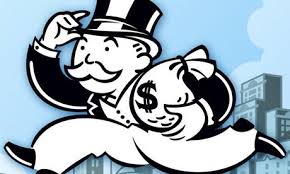More about free markets
I have written about the free market mythology before. I have pointed out that in the name of the free market, Congress has forbidden the government to bargain with drug companies over the price of medicines mostly bought by Medicare to be supplied to the elderly. But many of these medicines are sold by only one company that has a monopoly. The market rhetoric is in this case completely misplaced. There is no free market. Congressional legislation simply subsidizes the monopoly drug producer.
I have also pointed out that many of the devotees of the free market are adamant that we must close our borders to immigrants. But that flies in the face of free market ideology where competition, in this case, for jobs should not be limited by government action. If we really believed in the free market we would open our borders to all comers even though that would seriously depress wages.
One aspect of the free market mythology consists of the idea that private companies could do anything better than the government. Public services should therefore be privatized. As an example of that I have written about private prisons that provide inferior services to prisoners, allowing violence, rape of young men, and many forms of corruption in our prisons. The prison companies send their lobbyists into state legislatures to lobby for three strike rules and longer mandatory sentences regardless of whether those are good policies.. These companies are not interested in public policy. They are only interested in making more money. Privatizing government services is a very questionable practice.
But powerful myths die hard. It is worthwhile to point out the many contexts in which free markets, or what are thought to be free markets, are only damaging. I will continue to present examples of the failure of the free market myths when I run across them.
A recent conversation with a young man, recently graduated as a software engineer, provided a number of examples of the free market fallacy.
He pointed out that software companies often compete with each other on price. They must limit the amount of money they spend developing a piece of software in order to be able to undersell their competitors. In order to hold down the price of their product, companies limit the amount of time developers have available to perfect their product. The product may not be completely adequate but when time runs out the result of the development work will be sold to the public. The result is faulty software or software that does its job really badly. Market competition means inferior products for the consumer.
Some software companies have virtual monopolies. Microsoft is a prime example.
What do Windows users do when software does not work? According to the free market mythology they can go and buy a different product. But Windows has a monopoly. There is no free market in operating systems. If you don't like Windows you have to buy a whole new computer from Apple. The third option, Linux, is not a realistic choice for many computer users.
The free choice among competing products which is an essential part of a free market does not exist in many parts of our economy. It does not exist with respect to many pieces of software where one company is the only one who develops a program to solve a specific problem. It is often nonexistent in the field of medications where only one drug will address a specific illness and that drug is only produced by one company.
Even where a particular piece of software is produced by several competing software companies, free market mechanisms often do not work because the software is terribly expensive. A company that has invested in one example of the software may be very dissatisfied with the product they are using but they cannot afford to jettison it to buy a different one. Often, in addition, these very expensive and complex programs are sold with a five year maintenance contract and so the buyer is not free to return to the market in order to buy a competing product, if what he bought before proves unsatisfactory.
Software companies sell their programs. When the market is saturated they could close shop but that's not really an acceptable option. They could produce a different product but that would require a serious investment in time and money. So what they do instead is to bring out a new version of an older program. Programs that at one point were perfectly adequate for the majority of users, become more and more complex which creates a real burden for users and opens up that many more opportunities for software malfunctions.
Market competition and the myth of the free market do a whole lot of damage to the users of computer software – all of us. Repeating the clichés about the blessings of the free market are an apt way of shooting oneself in the foot. It is high time that we stopped allowing businesses to deceive us with their continued fairytales about the great benefits of the free market.




